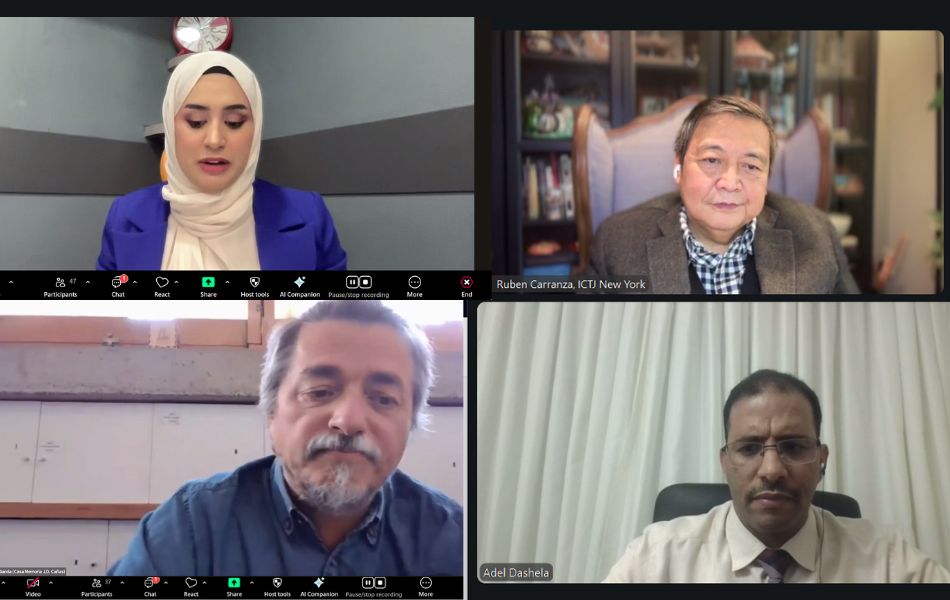
The Forum of Transitional Justice Ambassadors, represented by SAM Organization for Rights and Liberties and the Abductees’ Mothers Association, held its first webinar on transitional justice as part of the SPARK Project, supported by the DT Institute.
The event aimed to explore prospects for establishing a fair justice process in Yemen and to highlight Chile’s experience as a model from which lessons can be drawn to build a shared national memory and achieve equitable reconciliation that places victims at the heart of the process.
The seminar, held under the activities of the Forum of Transitional Justice Ambassadors, featured an in-depth discussion titled “From Yemen to Chile: A Study on the Chilean Experience in Transitional Justice and Its Potential Application in Yemen.”
Organizers described the event as a “critical moment” amid renewed debates about reconciliation and accountability in the country.
The session opened with remarks by Amsalam Al-Haj, Chairperson of the Abductees’ Mothers Association, who emphasized that the forum serves as an independent national platform bringing together victims, activists, experts, and decision-makers “to pave the way toward sustainable peace based on justice, fairness, and reconciliation.”
She noted that forum membership has expanded to over 240 members and underscored the importance of learning from international experiences and adapting them to the Yemeni context.
In the first segment, Dr. Adel Dashela, a Yemeni researcher and lecturer with a PhD in English literature specializing in political prison literature and visiting researcher at the University of Turku in Finland, presented his study published under the SPARK Project.
He affirmed that transitional justice represents “the real entry point to building a just peace in Yemen.”
He noted that years of war have left victims without redress and a society burdened with violations “without accountability or reparation,” warning against a culture of impunity.
Dr. Dashela linked Chile’s success to systematic civil documentation that preceded official state mechanisms and later provided truth commissions with credible materials.
In Yemen, he called for a unified national documentation system, a comprehensive reparations program, and a national memory project that transforms sites of violations into spaces of remembrance and learning.
He also cautioned against the politicization of civil society organizations and stressed the need for alliances with social, religious, and tribal institutions to keep the focus on victims “regardless of affiliation.”
In the second segment, Luciano García Schlegel, Chair of the José Domingo Cañas Memory House Foundation in Chile and an expert on memory and human rights policies, presented an analytical overview of the pillars of transitional justice as defined by the UN High Commissioner for Human Rights: truth, justice, reparations, guarantees of non-repetition, and memory.
He reviewed the path of truth commissions in Chile, challenges related to the confidentiality of some archives, and the gradual evolution of justice from the dominance of military courts and the 1978 Amnesty Law to later verdicts against perpetrators of violations.
He explained how “places of memory” were first initiated by civil society efforts before receiving official state recognition, noting that sustainable funding remains a challenge and that security sector reform and human rights culture are essential to prevent recurrence.
The third segment was led by Rubén Carranza, Senior Expert and Director of the Reparative Justice Program at the International Center for Transitional Justice (ICTJ) in New York.
He explained the interdependent relationship between stability and transitional justice, noting that the process does not “automatically create stability” but creates opportunities for accountability, truth, and reparations when properly sequenced and timed.
When asked about a “gold standard” for reparations in Yemen given limited resources, Carranza stressed that reparations require funding, which can come from recovering assets of those involved in or profiting from the conflict, both domestically and abroad.
He also highlighted the importance of symbolic and community-based approaches that gradually build trust and expand over time, cautioning against limiting reparations to financial compensation alone.
The seminar included an interactive discussion and audience questions addressing concerns about the politicization of civil society, criteria for participation in justice processes, and ways to protect collective memory from domination by a single narrative.
Questions also touched on documenting cross-border violations and balancing international dimensions with national reconciliation efforts.
Dr. Dashela emphasized that “transitional justice is a relative and gradual process” and that reparations can serve as a practical entry point to bridge divides between parties, drawing on customary and cultural traditions alongside modern legal tools.
The final recommendations outlined several practical steps:
Establishing a national digital archive for memory and testimonies under an independent and neutral authority.
Documenting individual stories rather than abstract statistics.
Transforming sites of violations into public memory spaces.
Building a civil-societal-religious alliance to protect victims and their rights.
Recovering assets to fund reparations programs.
Implementing institutional and cultural reforms to ensure non-repetition.
The meeting concluded that “a just peace begins with truth and fairness,” and that transforming Chile’s lessons into a uniquely Yemeni experience requires acknowledging victims, preserving memory, and launching a gradual and comprehensive path toward justice.